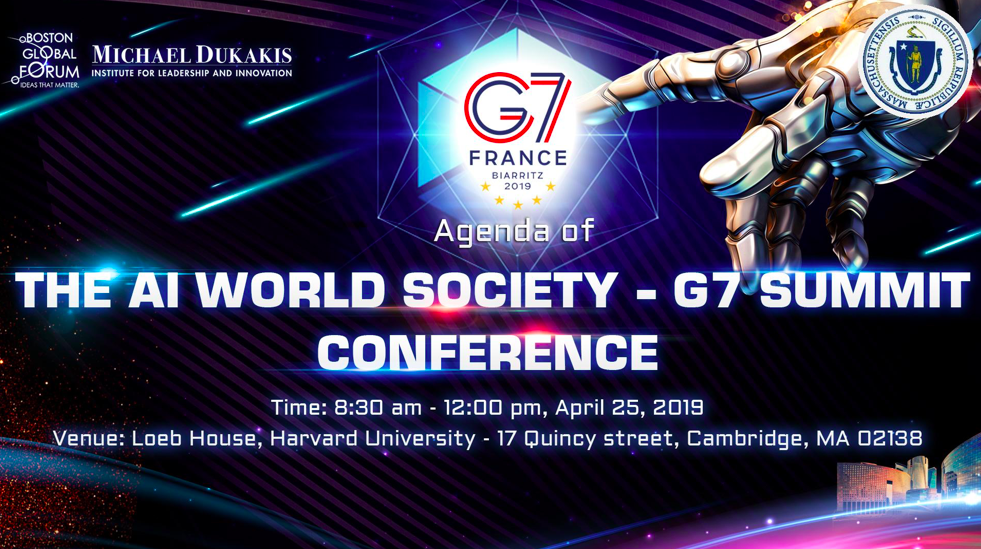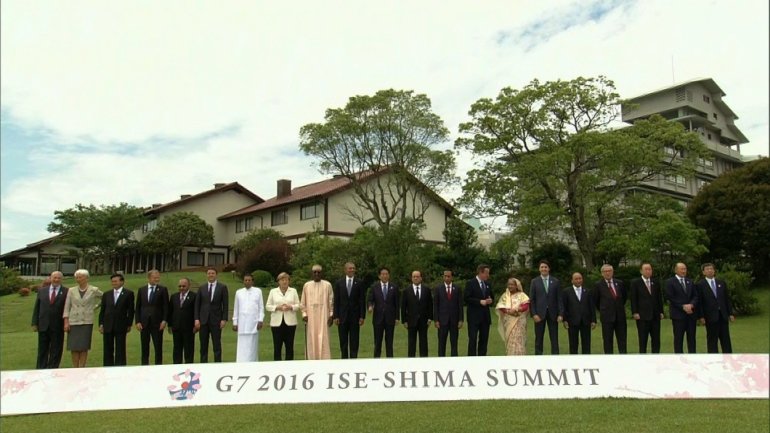
by Admin | Apr 4, 2019 | News
The forthcoming AI World Society – G7 Summit Initiative will focus on
the AI-Government Model for democracy in the age of Artificial Intelligence.
This is a new and evolutionary political development.
AI-Standards and Government Concepts
- Time: 8:30 am – 12:00 pm, April 25, 2019
- Venue: Loeb House, Harvard University, 17 Quincy Street, Cambridge, Massachusetts 02138
AGENDA of AIWS-G7 Summit Conference
- Governor Michael Dukakis: Opening Remarks
- Nam Pham、the Assistant Secretary of Business Development and International Trade, Governmentof Massachusetts: Congratulations
- Arnaud Mentré, Consul General of France in Boston: The French Perspective on Artificial Intelligence and the G7 Summit
- Professor Thomas Patterson: AI World Society – G7 Summit Initiative
- Governor Michael Dukakis: Presents the AI World Society – G7 Summit Initiative to the Government of France
- Vint Cerf, the Father of the Internet: Honored as World Leader in AI World Society (AIWS)
- Vint Cerf: Artificial Intelligence and the Future of the Internet
- Paul Nemitz: Legal Concepts for AI – Layer 4 of AI World Society
- Conference Delegates: Open Discussion
- Governor Michael Dukakis: Closing Remarks
Download Agenda AIWS-G7 Summit 2019

by Robert Whitcomb | Jun 5, 2016 | AI World Society Summit
(June 6th, 2016) Leaders at the G7 Summit approved the first international stand-alone agreement on cybersecurity, including data protection and Internet governance. A number of organizations, including the Boston Global Forum (BGF), submitted recommendations to the leaders for their consideration. The BGF’s recommendations included what it calls the Ise-Shima Norms for cyberbehavior, which builds on the BGF’s Ethics Code of Conduct for Cyber Peace and Security (ECCC). (Ise-Shima is the Japanese region where this year’s summit was held on May 26-27.)

World leaders attend the G7 2016 Ise-Shima Summit in Japan.
The BGF’s recommendations were part of its BGF-G7 Summit Initiative.
“We endeavor to develop policy frameworks that further promote effective privacy and data protection across jurisdictions to meet high standards of privacy and data protection,” according to a statement of principles in the G7 leaders’ agreement.
“We also welcome proactive approaches such as ‘Privacy by Design,’ which take privacy and protecting personal data into account throughout the engineering process. We recognize that protecting privacy and enhancing cybersecurity help ensure business and consumer trust and promote innovation crucial to our economic growth.”
“It sounds innocuous, but it’s not. It’s actually very significant,” John Savage, An Wang Professor of Computer Science at Brown University, told Roll Call’s Paul Merrion. Professor Savage is a BGF member who helped draft the Ise-Shima Norms.
“It’s progress, it’s recognition that nations need to help one another.”
The agreement also states that “no country should conduct or knowingly support ICT (information and communication technology)-enabled theft of intellectual property, including trade secrets or other confidential business information, with the intent of providing competitive advantages to its companies or commercial sectors.’’
It continued: “We commit to facilitate the free flow of information to ensure openness, transparency and freedom of the Internet, and a fair and equal access to the cyberspace for all actors {in the} digital economy while respecting privacy and data protection, as well as cybersecurity.’’
Further, the G7 affirmed: “We continue to support ICT policies that preserve the global nature of the Internet, promote the flow of information across borders and allow Internet users to access online information, knowledge and services of their choice. We oppose data localization requirements that are unjustifiable, taking into account legitimate public policy objectives.”
Professor Savage told Mr. Merrion: “That’s directed at the Chinese and Russians, but mostly the Chinese.” While it doesn’t directly and immediately affect these countries, “it’s a talking point,” he told Mr. Merrion

by Robert Whitcomb | Jun 3, 2016 | AI World Society Summit
(June 6th, 2016) We at The Boston Global Forum were very pleased that the G7 leaders at their May 26-27 summit in Japan included in their final declaration an important statement on cybersecurity. BGF experts had submitted to the leaders the BGF’s Ise-Shima Norms for cyberbehavior (named after the region where the summit was held).

The BGF’s recommendations were part of the BGF-G7 Summit Initiative.
Among the leaders’ comments on cybersecurity:
“We strongly support an accessible, open, interoperable, reliable and secure cyberspace as one essential foundation for economic growth and prosperity.’’
The leaders also announced initiatives on improving the global economy through coordinated fiscal and monetary policies; on migration and refugees; on trade; on infrastructure; on health; on improving the condition and status of women; on battling political and other corruption; on climate change, and on energy, including decarbonization.

by Robert Whitcomb | May 27, 2016 | Statements, Event Updates
(May 30th, 2016) G7 Summit host Shinzo Abe, the Japanese prime minister, said he and the other leaders of the most important industrialized democracies share a strong “sense of crisis’’ about the global economic outlook.

(From L-R) Sri Lanka’s President Maithripala Sirisena, German Chancellor Angela Merkel, Chad President Idriss Deby Itno, U.S. President Barack Obama, Japan’s Prime Minister Shinzo Abe, French President Francois Hollande and President of Indonesia Joko Widodo attend a family picture along with other world leaders during the final day of the Group of Seven (G7) summit meetings in Ise Shima, Japan May 27, 2016. REUTERS/Carlos Barria
G7 leaders wrapped up a summit in central Japan by, among other statements, vowing to use “all policy tools” to boost demand and ease supply constraints.
“Global growth remains moderate and below potential, while risks of weak growth persist,” they said in a declaration. “Global growth is our urgent priority.”
Mr. Abe referred to current parallels to the global financial crisis that followed the 2008 Lehman Brothers collapse.
“The most worrisome risk is a contraction of the global economy,” led by a slowdown in developing nation economies, he told reporters after chairing the two-day summit. “There is a risk of the global economy falling into crisis if appropriate policy responses are not made.”
by Robert Whitcomb | May 26, 2016 | AI World Society Summit
The leaders of the Group of Seven industrialized democracies agreed May 26 to help the middle class worldwide, by spurring economic growth, fighting corruption and clamping down on international tax evasion by the rich.
The agreement was reached during the first session of the G7 summit in Japan.
“We had discussion on the world economy and agreed that the world economy is facing . . . a major risk,” Japanese Prime Minister Shinzo Abe told reporters after the session.
To cope with that risk, the G7 members agreed to compile a set of economic measures to be called the Ise-Shima Economic Initiative, named for the location of the summit.
For details read:
http://www.japantimes.co.jp/news/2016/05/26/national/politics-diplomacy/g-7-vows-ease-plight-middle-class-worldwide/



